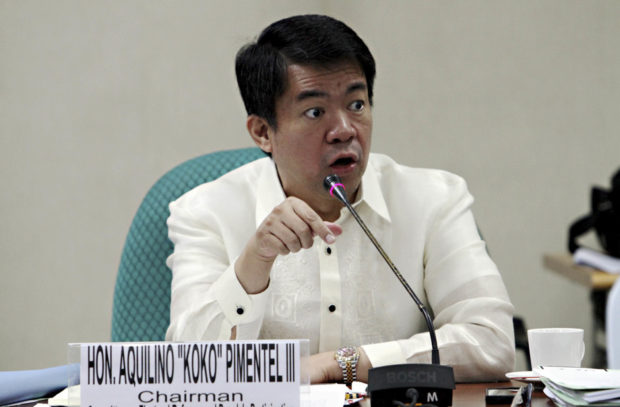Senate President Aquilino “Koko” Pimentel III has filed a bill which seeks to lower rates of political advertisements.
Pimentel filed on April 4 Senate Bill No. 1777, which seeks to amend Section 11 of RA 9007 or the Fair Election Act, which provides cap on rates of political propaganda.
The proposed measure specifically seeks to lower the cost of political advertisements by 50 percent for television, 30 percent for radio, and 20 percent for print ads, compared to the average rates charged to their most favored advertisers during the first three quarters of the two calendar years preceding the elections.
According to the bill, most favored advertisers are those that are charged the lowest rates by a media entity.
At present, during election period, registered political parties and candidates are given a discounted rate of 30 percent for television, 20 percent for radio, and 10 percent for print ads over the average rates charged during the first three quarters of the calendar year preceding the elections.
The next scheduled elections are on May 14 for the barangay and Sangguniang Kabataan polls, and in 2019 for the national midterm elections.
“Article II, Section 26 of our Constitution provides that the State shall guarantee equal access to opportunities for public service. In this day and age, an undeniable feature of running a successful election campaign involves media exposure,” Pimentel said in a statement Thursday.
“Unfortunately, many qualified but financially disadvantaged candidates are unable to compete in this regard because of prohibitive rates charged by media entities”, he added.
The Senate chief said “media entities have always been willing to lower rates for certain parties, and therefore there should be no issue with lowering prices in the interest of democratizing public service.”
He added that money was never a qualification for public office under the Constitution, “but only rich people or those backed by wealthy financiers are able to run due to the costs of campaigning.”
“The reason we have campaign spending limits is due to the temptation for corruption generated by excessive expenses during a campaign. Some politicians think it entitles them to ‘recoup’ their ‘investment’ using public funds,” he said.
For Pimentel, reining in runaway campaign spending would allow more candidates to run, giving people more choices during the election.
